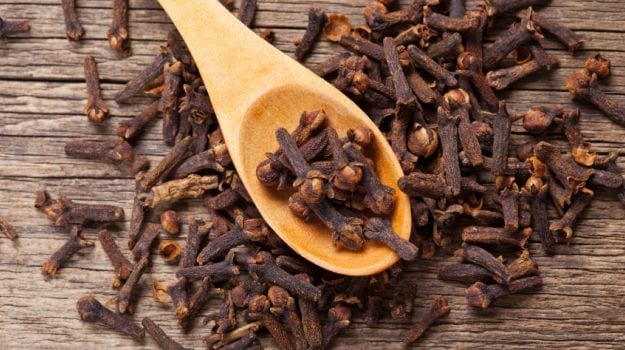Health Benefits of Cloves (Laung)

One of my favourite winter spices, cloves are often pushed to the edge of your plate. They are mostly used to flavour dishes but seldomly eaten whole. But if you’d know about their impressive qualities, you’d agree they deserve more attention.Looking back, cloves were probably first used by Chinese emperors to hide bad breath. Over the years, cloves grabbed a prominent place in traditional Chinese medicine and Ayurveda to treat nausea, digestive disorders and flu. The clove tree which is native to Indonesia bears dry, aromatic flower buds which are used as a spice. These unopened, pink buds are picked and dried till they turn brown. They can be used whole or ground. When cooked or soaked in water, they tend to become soft and flavourful. Cloves have a long shelf life and this flowering spice will last you almost a year if stored away from light and moisture. Powered cloves tend to lose their flavour faster.The sweet aroma sparks memories of the good things about winter - frosted windows and cloves swirling in a hot cup. The pungent and peppery flavour leaves you with a warm fuzzy feeling – just what you need during those chilly days.The active component of cloves is the eugenol oil. This oil makes up about 60-90% of each clove and it acts against bacteria, viruses and fungi. The oil is known for its antiseptic, anesthetic, aromatic and astringent properties.
According to Dr. Ashutosh Gautam from Baidyanath, “Clove oil is one of
the richest sources of antioxidants. In aromatherapy, it is used as an
antiseptic and pain reliever
especially for toothaches and stomach pain. It is often mixed with
other oils to treat various disorders. For instance, those who have troubled sleep
can apply some warm clove oil along with sesame oil on the forehead to
feel calm and relaxed.”To make clove infused oil at home, start with
toasting a table spoon of whole cloves over medium heat. This helps in
mobilizing the volatile oils and makes it easier to extract them.
Lightly tap the heads to crack them open and add them to a cup of olive
oil or coconut oil. Alternatively, you can grind them and place the
powder in a cheesecloth and dip it in the oil jar. Seal with a lid and
let it sit for 10 to 15 days but don’t forget to shake it every couple
of days. For a stronger flavour you can use more cloves or let them
steep for a longer time. Strain and it’s good to use. Since clove
essential oil is very potent in nature, it's best to dilute it.In
Ayurveda, cloves are said to be kaphahar which means that they have the ability to balance the kapha dosha.
Kapha governs the structure and fluid in the body. Its primary function
is protection. Being carminative in nature, it helps in improving digestion.
A carminative is any herb or preparation that prevents the formation of
gas in the gastrointestinal tract or helps with expulsion. Therefore,
it is suggested you add cloves while cooking foods like kidney beans or
black gram that tend to cause flatulence. I simply love the wonderful
spiciness it adds to everything.At home, using cloves for clearing up cold
has been an ancient natural remedy. You can sip away the symptoms of
flu and congestion with a healing brew of cloves, cinnamon and some
whole cardamoms infused in tea. You can even inhale the vapours of
cloves or clove oil and then sit back and breathe easy. From my
grandmother’s treasure trove of home remedies, cloves are great to clear acne and blemishes.
Make a paste with cloves, some honey and a drop of lime. Leave it on
for 15 minutes and rinse off for glowing skin. Moreover, clove oil is
very effective in treating dry and itchy skin.
Another clever use of cloves was when she would toss some in the
wardrobe and other places to cover up odours.The strong, spicy scent can
do wonders even while cooking meats like fish or pork where the fleshy
smell may put some people off. I usually like to stick some cloves in an
onion bulb and use it to stir my soup. That gives it a warm and intense
flavour.